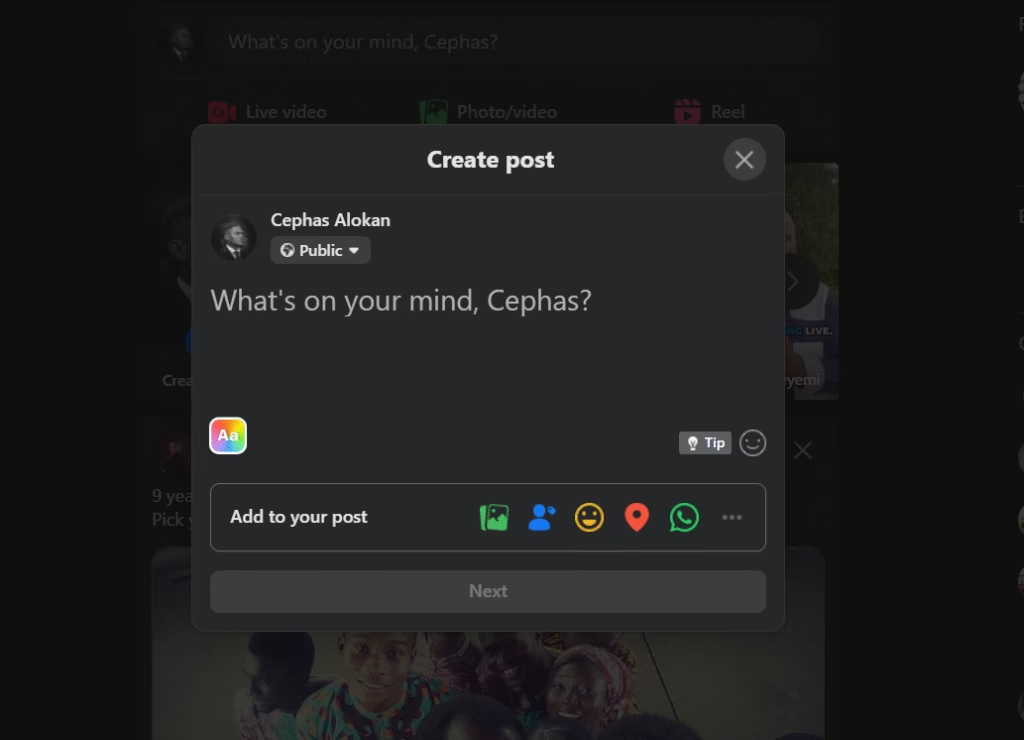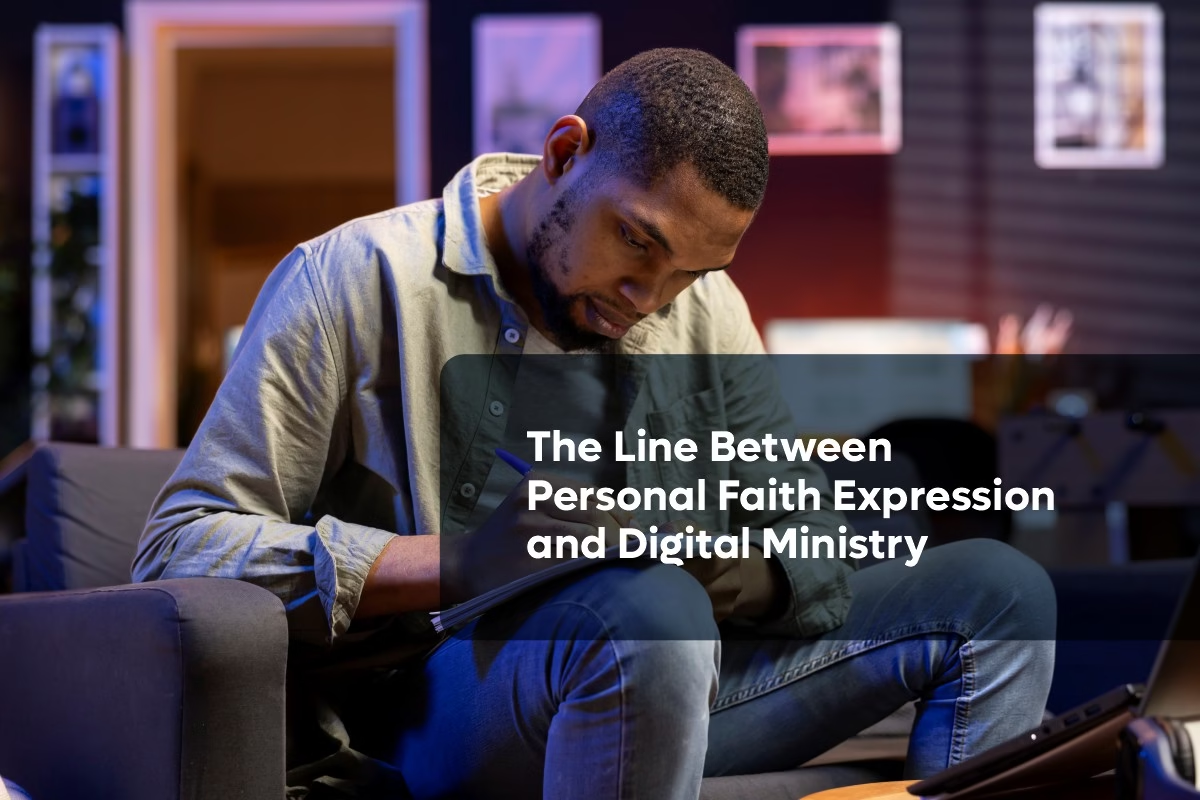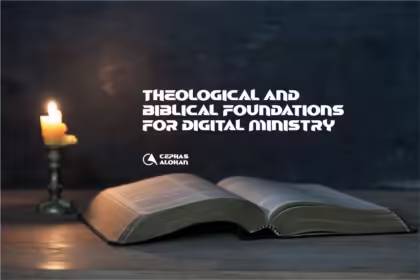This got me thinking a while back. We have people who share things about their faith online. One person might post a photo from Sunday service with a short motivational word or scripture attached. Another might just share a Bible verse, a biblical quote, or something similar. But looking at these sets of people, are they actually doing digital ministry, or are they just creating content?
We need to draw a clear line because some people assume they are doing digital ministry when, in reality, what they are doing is simply content creation.
The kind of ministry I am talking about here is one that carries a sense of calling, vision, and assignment. Because, from a broader perspective, everyone is doing ministry in one way or another since ministry simply means service.
Yet, the difference between casual sharing and digital ministry may look small on the surface, but it is very significant. I talked about this more in Understanding Content Ministry: A Comprehensive Guide
Just as there is a difference between a church member who occasionally tells their family about Jesus and a pastor who leads an organized ministry, there is also a difference between someone casually posting scriptures and someone who is called to steward lives through digital platforms.
So, let’s go deeper into this issue. Understanding this difference will not only give you clarity but also help you know where you stand.
Sharing as a Personal Expression of Faith
When a believer shares online, most times it comes from a place of love for God and a desire to inspire others. It is a personal expression of faith. Think of someone who posts a verse that spoke to them during morning devotion, or someone who uploads a clip from a sermon that really blessed them. They are not building anything structured, they are simply expressing what is in their heart.

There is nothing wrong with this. In fact, it is powerful. Many people have been encouraged, comforted, or even drawn to God through one simple post shared out of genuine conviction. But we must be careful not to confuse this with digital ministry. At this stage, what is happening is personal and spontaneous not necessarily intentional in the sense of stewardship.
This is very similar to a Christian who shares the gospel with their family members, classmates, or colleagues. They are living out their faith and being a witness, which is what every believer is called to do. But just as we would not call that person a pastor simply because they told their roommate about Jesus, we cannot call every act of online sharing a digital ministry.
What Makes It Ministry – Digital Ministry?
Ministry is not just about speaking or sharing; it is about carrying a divine mandate. Digital ministry begins when what you share is no longer random or occasional, but is guided by a sense of calling, vision, and assignment. At this point, it stops being about “I just feel like posting today” and becomes “I am sent to steward lives through this platform.”
The difference is intention and responsibility. A digital minister knows they are not only putting out content; they are shaping people, discipling them, and pointing them consistently to Christ.
There is structure, there is consistency, and there is accountability. Programs may form, discipleship pathways may emerge, and the minister begins to carry people in prayer, in teaching, and in counsel—even though it is happening online.
Think about the local church again. Every believer is called to share the gospel, but when someone is called into pastoral ministry, there is an added weight. That pastor carries the responsibility of nurturing souls, teaching doctrine, and leading with order.
In the same way, digital ministry is not random; it is an intentional expression of God’s call in the digital world. And because this calling can manifest in different ways, the 5 core branches of digital ministry serve as a guide to help you discern where you are sent.
Clear Distinctions Between Personal Expression and Digital Ministry
Here are some of the ways to know the difference between simply sharing your faith online and actually running a digital ministry:
- Personal Expression is casual, ministry is intentional. One is spontaneous, driven by inspiration in the moment. The other is guided by a clear sense of vision and calling.
- Personal Expression is occasional, ministry is consistent. You may share a verse today and stay silent for weeks, while digital ministry requires steady rhythms and commitment.
- Personal Expression is unstructured, ministry is organized. Sharing is random and without form. Ministry builds systems, platforms, and pathways that people can follow.
- Personal Expression is free of responsibility, ministry carries accountability. When you share casually, you owe no one a follow-up. When you do ministry, you answer to God and often to a community.
- Personal Expression inspires; ministry transforms. Both can bless people, but ministry is more deliberate about producing fruit in lives, not just sparking momentary encouragement.
Both roles are valuable, but they are not the same. One is simply a personal witness, the other is a divine mandate expressed in a structured way.
If you’ve ever wondered what really qualifies as digital ministry and what doesn’t, you’ll find a clear breakdown in Digital Ministry 101: Understanding What It Is and What It’s Not.”
Signs You’re Called into Digital Ministry
How do you know when your online sharing has crossed the line into digital ministry? Here are some strong indicators:
- You feel a burden beyond casual sharing. It is no longer just about posting what excites you. You carry a weight in your heart for people you may never meet physically. Their growth, their salvation, and their discipleship become part of your daily concern.
- You see fruit and testimonies. People are not just liking your posts—they are reaching out to say their lives were changed, they made decisions for Christ, or they found direction through what you shared. Fruit is always a sign of ministry.
- You are consistent and intentional. It is not random anymore. You post on purpose, you prepare ahead, and you even plan content with the same seriousness a pastor prepares a sermon.
- You start creating structure. Ministry requires order. Maybe you form a Bible study group on WhatsApp, launch a discipleship podcast, or create weekly teaching series.
- You sense accountability before God. When you miss a teaching, you feel the same way a pastor feels when he neglects his flock. You know heaven is watching what you are doing, and you can no longer treat it as just social media fun.
- You prioritize impact over visibility. While others chase numbers, your heart is after souls. You would rather have ten people transformed than ten thousand views with no lasting change. That is ministry thinking.
- You can trace it back to a calling. Somewhere in your journey, God impressed on your heart that you are sent to serve in the digital space. It might have come through prayer, prophecy, or a growing conviction—but you know it is more than a hobby.
These signs show that what you are doing online is not just personal expression anymore, else, it is becoming digital ministry, and it must be treated with the same reverence as any other platform of service.
Where Do You Stand?
The line between sharing your faith online and running a digital ministry is thin, but it is very real. Both are valuable.
Every believer is called to witness, to testify, and to shine their light in their own way. But not everyone is called to build a digital ministry. When God places a mandate in your heart, gives you a vision, and entrusts you with people, that is stewardship.
This clarity is not just for today—it determines how we remain effective tomorrow. That’s why How Ministries Can Stay Relevant in a Tech-Driven World is a timely reminder for anyone serving in the digital space.
Where do you stand? Are you simply expressing your faith in the moment, or has God given you an assignment to steward lives through digital platforms? Neither position is inferior, but clarity is everything. Because once you know where you stand, you will know how to walk—either as a faithful believer shining light wherever you are, or as a digital minister carrying out a mandate with intentionality, structure, and accountability.






